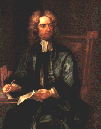
Swift's works that contain religious satire are both the Argument Against Abolishing Christianity and of course, Tale of a Tub.
The Tale of a Tub was a story about three brothers, each who stood for a religion. There was Jack (Calvin) and Peter (Catholic) and Martin (Luther). Swift intended to make Martin look the best, but the effect of his brilliant burlesque is to discredit all forms of dogmatic Christianity (Hodgart 118). Swift's politics of seeing dissent and fanaticism on an equal level to Catholicism is prevalent in this story. "Papists and Fanaticks, tho' they appear the most Averse to each other, yet bear a near Resemblance in many things, as has been observed by Learned Men" (Tale). Jack and Peter, two of the brothers, are friends and "in agreement" under the "tyranny" of Peter. This is a very obvious reference to Protestantism growing under the oppression of Catholicism, in different forms. Swift also characterises religions in the coats the brothers wear. Like their brother Peter, the two other brothers wear coats have the trimmings that are in current fashion, an reference to Christianity's changing with the times and for what people think it should stand for over the time being. Peter's beginning to decorate his coat signifies Catholics adding many things to Christian doctrine. At one point, Lord Peter (an oppressive ruler) gets Jack to side with him against Martin. This is an analogy to King James II, who was a Catholic, and proposed that the Presbyterians join him against the Anglicans. When one reads this burlesque, one is not surprised to learn that Swift was intolerant of other forms of Christianity, and greatly opposed dissent.
Swift's equating the fanaticism of Quakers and Puritans to the previous fanaticism of Catholicism is boldly shown as Jack keeps getting mistaken for Peter everywhere he goes. Even though Jack tries hard to get away from this by damaging his coat and tearing away the trimmings (i.e. like Oliver Cromwell, destroying churches and gilded religious objects seen as vanity) it is to no avail, because they both look alike from far away. Martin, meanwhile, stands out against them both because of his patience and moderation. Jack tries to get Martin to destroy his coat, but Martin refuses saying that it was unfit for them have their actions formed by what they see their brother do, rather they should do what their father wanted. In this part, Swift's depiction of Martin being the diplomatic one is supposed to uphold the Church of England as being the most proper, because it does things to moderation yet accurately follows the rules of Christianity. Swift's religious views on Protestant dissent and Popery are flagrantly portrayed by the story of the three brothers, and looking at his life as an Anglican clergyman who is an "ecclesiastical Tory" opposed to Protestant immigration, this story becomes all the more clear to the reader.
The readers, especially Whigs, were shocked at the apparent profanity of the ridiculous way Swift made major religions looked. Whigs read the book as irreligious and as an attack on the principles of 'Moderation' (Higgins 102).
| Back to Home | Previous Page | Next Page |